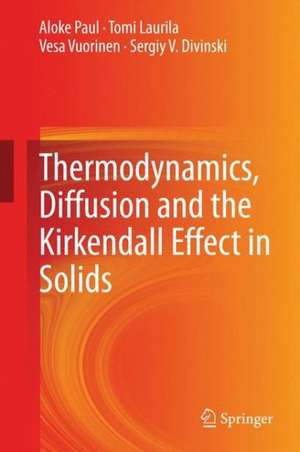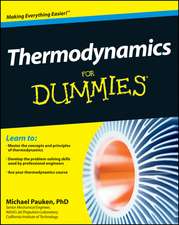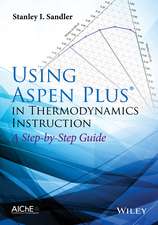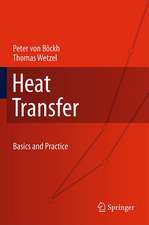Thermodynamics, Diffusion and the Kirkendall Effect in Solids
Autor Aloke Paul, Tomi Laurila, Vesa Vuorinen, Sergiy V. Divinskien Limba Engleză Hardback – 30 iul 2014
| Toate formatele și edițiile | Preț | Express |
|---|---|---|
| Paperback (1) | 956.50 lei 43-57 zile | |
| Springer International Publishing – 17 sep 2016 | 956.50 lei 43-57 zile | |
| Hardback (1) | 962.66 lei 43-57 zile | |
| Springer International Publishing – 30 iul 2014 | 962.66 lei 43-57 zile |
Preț: 962.66 lei
Preț vechi: 1173.97 lei
-18% Nou
Puncte Express: 1444
Preț estimativ în valută:
184.26€ • 200.22$ • 154.88£
184.26€ • 200.22$ • 154.88£
Carte tipărită la comandă
Livrare economică 21 aprilie-05 mai
Preluare comenzi: 021 569.72.76
Specificații
ISBN-13: 9783319074603
ISBN-10: 3319074601
Pagini: 548
Ilustrații: XVIII, 530 p. 314 illus., 126 illus. in color.
Dimensiuni: 155 x 235 x 35 mm
Greutate: 0.94 kg
Ediția:2014
Editura: Springer International Publishing
Colecția Springer
Locul publicării:Cham, Switzerland
ISBN-10: 3319074601
Pagini: 548
Ilustrații: XVIII, 530 p. 314 illus., 126 illus. in color.
Dimensiuni: 155 x 235 x 35 mm
Greutate: 0.94 kg
Ediția:2014
Editura: Springer International Publishing
Colecția Springer
Locul publicării:Cham, Switzerland
Public țintă
ResearchCuprins
Thermodynamics, phases and phase diagrams.- Structure of Materials.- Fick’s laws of diffusion.- Development of interdiffusion zone in different systems.- Atomic mechanism of diffusion.- Interdiffusion and the Kirkendall effect in binary systems.- Growth of phases with narrow homogeneity range and line compounds by interdiffusion.- Microstructural evolution of the diffusion zone.- Interdiffusion in multicomponent systems.- Short circuit diffusion.- Reactive phase formation in thin film systems.
Notă biografică
Aloke Paul is an associate professor in the Department of Materials Engineering, Indian Institute of Science (IISc), Bangalore, India. Professor Aloke Paul is currently running an active research group working on diffusion related problems with major areas of research including developing new phenomenological models in solid-state diffusion, materials in electronic packaging, bond coat in jet engine applications and growth of A15 intermetallic superconductors. He teaches a postgraduate level course on diffusion in solids and has guided several PhD and ME students. He has co-authored more than 80 articles in various international journals.
Professor Tomi Laurila received his D.Sc. degree (with honours) in electronics production technology from the Helsinki University of Technology in 2001. He presently works as a teaching scientist in the group of Electronics Integration and Reliability and holds an adjunct professorship on Electronics Reliability and Manufacturing. His research currently involves the study of interfacial reactions between dissimilar materials used in micro and bioelectronics. He has published extensively, including around 70 scientific papers, book chapters and a text book, on topics such as the thermodynamic-kinetic analysis of interfacial reactions, electrochemical detection of biomolecules and issues related to reliability testing of electronic devices. Professor Laurila is also responsible for the teaching of material science, electronics reliability and bio-adaptive technology to undergraduate, postgraduate and postdoctoral students.
Dr. Vesa Vuorinen received a D.Sc. degree in electronics production technology from the Helsinki University of Technology in 2006. Since then he has been working as a research scientist and full-time teacher in the group of Electronics Integration and Reliability at Aalto University. His research includes manufacturing and reliability of high-density electronics assemblies with emphasis on soldering metallurgy and thermodynamics of materials.
Dr. Sergiy Divinski is a Privat-Docent at the Institute of Materials Physics, University of Münster, Germany, where he leads the radiotracer laboratory. He teaches graduate and postgraduate courses on diffusion in solids, numerical methods in material science and different aspects of materials science. He has co-authored more than 150 articles in various international journals and several book chapters in the field of diffusion in solids.
Professor Tomi Laurila received his D.Sc. degree (with honours) in electronics production technology from the Helsinki University of Technology in 2001. He presently works as a teaching scientist in the group of Electronics Integration and Reliability and holds an adjunct professorship on Electronics Reliability and Manufacturing. His research currently involves the study of interfacial reactions between dissimilar materials used in micro and bioelectronics. He has published extensively, including around 70 scientific papers, book chapters and a text book, on topics such as the thermodynamic-kinetic analysis of interfacial reactions, electrochemical detection of biomolecules and issues related to reliability testing of electronic devices. Professor Laurila is also responsible for the teaching of material science, electronics reliability and bio-adaptive technology to undergraduate, postgraduate and postdoctoral students.
Dr. Vesa Vuorinen received a D.Sc. degree in electronics production technology from the Helsinki University of Technology in 2006. Since then he has been working as a research scientist and full-time teacher in the group of Electronics Integration and Reliability at Aalto University. His research includes manufacturing and reliability of high-density electronics assemblies with emphasis on soldering metallurgy and thermodynamics of materials.
Dr. Sergiy Divinski is a Privat-Docent at the Institute of Materials Physics, University of Münster, Germany, where he leads the radiotracer laboratory. He teaches graduate and postgraduate courses on diffusion in solids, numerical methods in material science and different aspects of materials science. He has co-authored more than 150 articles in various international journals and several book chapters in the field of diffusion in solids.
Textul de pe ultima copertă
Covering both basic and advanced thermodynamic and phase principles, as well as providing stability diagrams relevant for diffusion studies, Thermodynamics, Diffusion and the Kirkendall Effect in Solids maximizes reader insights into Fick’s laws of diffusion, atomic mechanisms, interdiffusion, intrinsic diffusion, tracer diffusion and the Kirkendall effect.
Recent advances in the area of interdiffusion will be introduced, while the many practical examples and large number of illustrations given will serve to aid researches working in this area in learning the practical evaluation of various diffusion parameters from experimental results.
With a unique approach to the two main focal points in solid state transformations, energetics (thermodynamics) and kinetics (interdiffusion) are extensively studied and their combined use in practise is discussed. Recent developments in the area of Kirkendall effect, grain boundary diffusion and multicomponent diffusion are also covered extensively.
This book will appeal to students, academicians, engineers and researchers in academic institutions, industry research and development laboratories.
Recent advances in the area of interdiffusion will be introduced, while the many practical examples and large number of illustrations given will serve to aid researches working in this area in learning the practical evaluation of various diffusion parameters from experimental results.
With a unique approach to the two main focal points in solid state transformations, energetics (thermodynamics) and kinetics (interdiffusion) are extensively studied and their combined use in practise is discussed. Recent developments in the area of Kirkendall effect, grain boundary diffusion and multicomponent diffusion are also covered extensively.
This book will appeal to students, academicians, engineers and researchers in academic institutions, industry research and development laboratories.
Caracteristici
Solves open problems in the analysis and structure of thermodynamics and diffusion in the solid state Demonstrates the laboratory procedures and experimental results Shows the calculation procedures of different kinds of diffusion parameters and structure of thermodynamics and diffusion in the solid state Shows the calculation procedures of different kinds of diffusion parameters Includes supplementary material: sn.pub/extras











